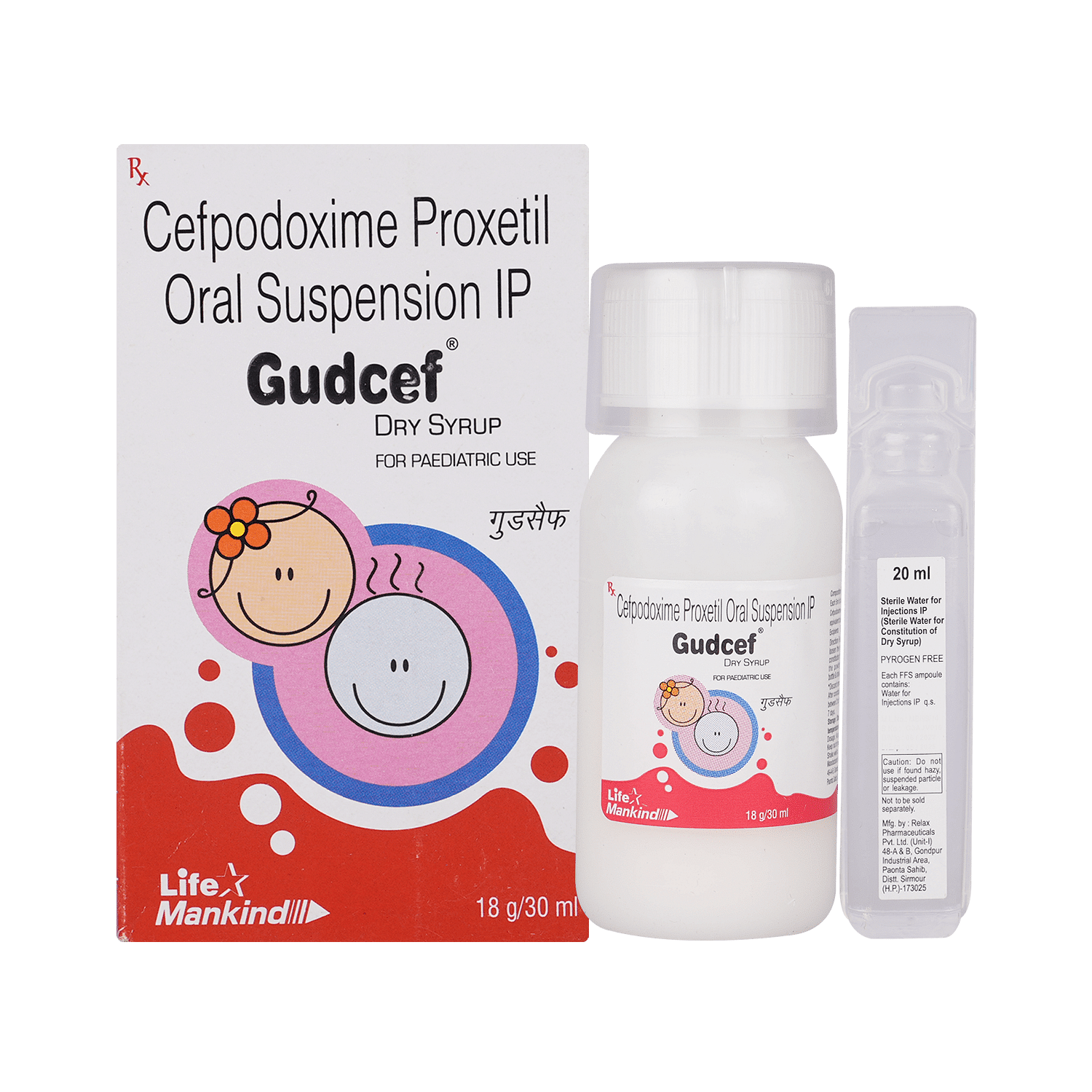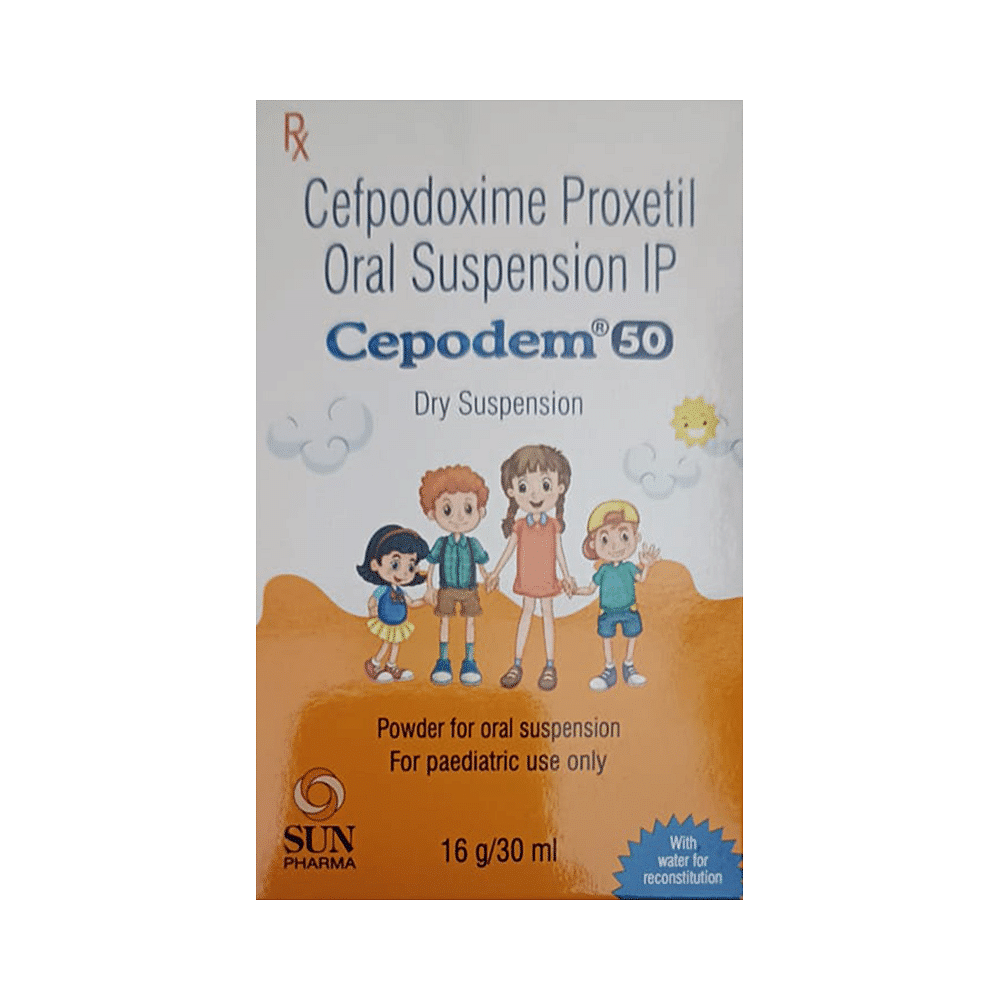
Doxilens 50 D/S Dry Syrup
Manufacturer
Starlance Pharmaceuticals
Salt Composition
Cefpodoxime Proxetil (50mg)
Key Information
Short Description
Doxilens 50 D/S Dry Syrup is an antibiotic medicine used to treat a wide range of bacterial infections in children, including ear, eye, nose, throat, lung, skin, gastrointestinal tract, and urinary tract infections, as well as typhoid fever.
Dosage Form
Oral Suspension
Introduction
Doxilens 50 D/S Dry Syrup is an antibiotic medicine commonly given to children for the treatment of a wide range of bacterial infections. It is effective in treating infections targeting the ears, eyes, nose, throat, lungs, skin, gastrointestinal tract, and urinary tract. It is also used to treat typhoid fever in children and adolescents.
Directions for Use
Give this medicine with food to avoid an upset stomach. Encourage your child to drink plenty of water in case diarrhea develops as a side effect.
How it works
Doxilens 50 D/S Dry Syrup is an antibiotic that works by preventing the formation of the bacterial protective covering (cell wall) which is essential for the survival of the bacteria. By doing so, this medicine stops the infection-causing bacteria from growing further and prevents the infection from spreading without making the bacteria resistant to further treatment.
Quick Tips
Your child must complete the entire course of antibiotics. Stopping too soon may cause the bacteria to multiply again or become resistant or cause another infection. Give this medicine with food to avoid an upset stomach. Encourage your child to drink plenty of water in case diarrhea develops as a side effect. Conditions like common cold and flu are caused by viruses. Never use this medicine for such conditions. Only give Doxilens 50 D/S Dry Syrup to your child for their current infection. Never save medicine for future illnesses.
Related Medicines

Gudcef Dry Syrup

Cepodem 50 Dry Suspension

Pecef 50 Oral Suspension

Nefdoxim Dry Syrup

Cefrodox Dry Syrup

Cefodox 50mg Oral Suspension

Podoxyl 50 Dry Syrup

Drapod 50 Oral Suspension

Crapod 50mg Oral Suspension

Olipod 50 Dry Syrup
Frequently asked questions
What if I give too much of Doxilens 50 D/S Dry Syrup by mistake?
While an extra dose of Doxilens 50 D/S Dry Syrup is unlikely to cause harm, it is important to consult a doctor immediately if you believe your child may have overdosed. Overdose can result in unwanted side effects and potentially worsen their condition.
Are there any possible serious side effects of Doxilens 50 D/S Dry Syrup?
Serious side effects, such as persistent vomiting, kidney damage, allergic reactions (including rashes), diarrhea, and severe gastrointestinal infections, may occur. It's crucial to immediately contact a doctor if these symptoms arise.
Can other medicines be given at the same time as Doxilens 50 D/S Dry Syrup?
Doxilens 50 D/S Dry Syrup can interact with certain other medications. Always inform your child's doctor about all other medications they are taking before starting Doxilens 50 D/S Dry Syrup. It is important to get guidance from a doctor regarding any new medication for your child.
Can I get my child vaccinated while on treatment with Doxilens 50 D/S Dry Syrup?
Antibiotics are generally safe when used in conjunction with vaccines. However, children taking antibiotics should not receive vaccinations until they have recovered from the illness causing the need for antibiotic use. Once your child feels better, a doctor can help you determine if it's safe to administer the vaccine.
Which lab tests may my child undergo while taking Doxilens 50 D/S Dry Syrup on a long-term basis?
Periodic kidney function and liver function tests may be recommended during long-term treatment with Doxilens 50 D/S Dry Syrup to monitor your child's condition.
The mucus coming out of my child’s nose is yellow-green. Is it a sign of a bacterial infection?
Yellow or green mucus in the nose usually does not indicate the need for antibiotics and is often normal during a common cold. Symptoms generally resolve within 7 to 10 days. If your child's symptoms persist, contact their doctor.
My child is having a sore throat and ear infection. Can I give antibiotics?
No. Antibiotics are not effective for viral infections like the common cold or sore throat. If your child has any of these symptoms, it's likely due to a virus. Please consult their doctor for advice.
Does a common cold caused by viruses always result in a secondary bacterial infection? When to start an antibiotic to prevent infection?
Viruses usually do not lead to bacterial infections unless the immune system is compromised. Using antibiotics in this situation will not benefit your child and may even have unwanted side effects. Consult your doctor for appropriate treatment options.
Can Doxilens 50 D/S Dry Syrup impact my child’s digestive system?
Children's gut systems can be sensitive, sometimes causing stomach upset while taking antibiotics. Additionally, the use of Doxilens 50 D/S Dry Syrup might negatively affect the good bacteria in the gut. This could increase their susceptibility to other infections and worsen symptoms.
Can Doxilens 50 D/S Dry Syrup lead to bacterial resistance in my child?
Yes, using antibiotics without proper guidelines or for viral infections can contribute to the development of antibiotic resistance. It’s crucial to consult with a doctor to ensure the appropriate use and dosage of medications.


